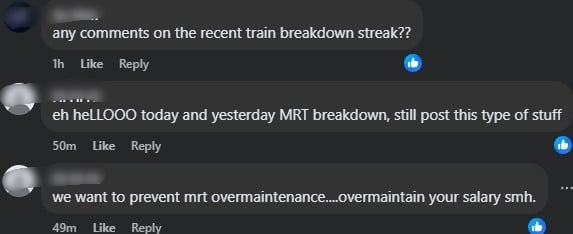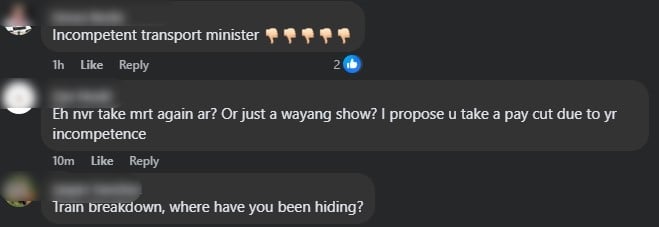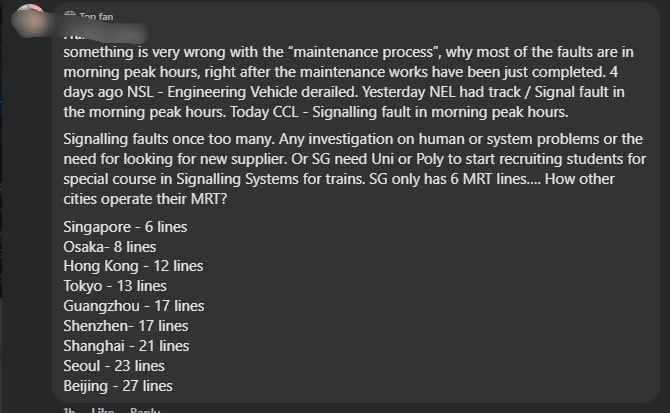Commuters in Singapore took to social media to express frustration over three MRT breakdowns within a week, demanding accountability.
Some netizens specifically criticised Transport Minister Chee Hong Tat, calling him “incompetent” in addressing the repeated train disruptions.
On the morning of 11 February, a signalling fault on the Circle Line triggered power trips, bringing train services to a standstill at eight stations.
Although power was restored within five minutes and trains resumed movement at 8.20 am, the central automatic train system remained sluggish, delaying a full recovery.
SMRT stated that normal operations were restored within 30 minutes, though congestion at key interchange stations required additional trains to clear the crowds. Station staff were deployed to assist commuters, public announcements were made, and SMRT apologised for the inconvenience.
Photos circulating on social media showed overcrowded platforms at Dhoby Ghaut, Serangoon, and Buona Vista stations, as frustrated commuters aired their grievances online.
The latest breakdown occurred just a day after another two-hour disruption on 10 February, when a signalling fault on the North East Line (NEL), operated by SBS Transit, caused delays during peak hours.
Earlier, on 7 February, train services on the North-South and East-West MRT lines were disrupted after an engineering vehicle derailed in the morning, preventing some trains from leaving Bishan Depot. The affected tracks were eventually cleared by the evening.
Netizens Question Accountability and Systemic Flaws in Singapore’s Public Transport
Observing comments on CNA, The Straits Times and a discussion thread on Reddit, many highlighted concerns about accountability and systemic flaws in Singapore’s public transport infrastructure.
They criticised the lack of preventive measures despite heavy investments and high salaries for transport leadership, questioning why disruptions continue to occur frequently.


Notably, some netizens took to Chee’s Facebook page, demanding an explanation for the recent streak of breakdowns, while others criticised his incompetence in maintaining train service quality.


One comment questioned the effectiveness of the MRT maintenance process, pointing out that recent faults often occur during morning peak hours, right after maintenance work is supposedly completed.
The comment also called for investigations into whether frequent signalling issues stem from human errors, system flaws, or the need for a better supplier, even suggesting the introduction of specialised courses in train signalling systems.

Netizens Suggest Minister Chee Experience Morning Peak Hour Breakdowns Firsthand
Meanwhile, some criticised the Transport Ministry’s leadership, urging them to be more in touch with commuters’ experiences.
Sarcastically, some suggested that the minister should ride the trains during morning peak hours to experience the breakdowns firsthand.


Others recalled Chee’s statement in Parliament in October 2024, where he defended the public transport fare hike, arguing that fares should not be tied to service levels or disruptions.

One comment even questioned, “Has the recent fare increase helped reduce breakdowns?”

Chee opposed link between fare adjustments and train service reliability
On 15 October 2024, Chee delivered a Ministerial Statement on the six-day East-West Line disruption that occurred in September.
The six-day EWL disruption, one of Singapore’s worst MRT incidents in 37 years, affected over 2.6 million passengers. LTA has launched an investigation and appointed an Expert Advisory Panel (EAP) to review the findings and provide technical recommendations.
Chee dismissed a suggestion by Workers’ Party MP Gerald Giam to link fare adjustments to train service reliability, arguing that the Public Transport Council (PTC) had previously examined the feasibility of connecting fare reviews to service levels and disruptions but ultimately chose not to pursue this approach, as other measures are already in place to ensure service standards are met.
He noted that the Land Transport Authority (LTA) investigates service disruptions, identifies accountability, and imposes penalties if necessary.
Operators that fail to meet reliability targets also forfeit payments under the government’s incentive schemes.
Responding to Giam’s question on whether service levels could be considered in the PTC’s fare review exercise, Chee clarified that the annual fare review is designed to ensure fares keep up with changes in operating costs, maintaining the financial sustainability of the transport system.
He pointed out that while the maximum allowable fare increase this year was 18.9%, PTC raised fares by only 6% to ensure affordability.
“If our fares are not adjusted to reflect rising operating costs, the persistent shortfall would have a chronic impact on service quality and reliability over time,” he added.
“Or if we want to continue topping up the shortfall via government subsidies, it means that taxpayers will have to foot a higher bill.”


